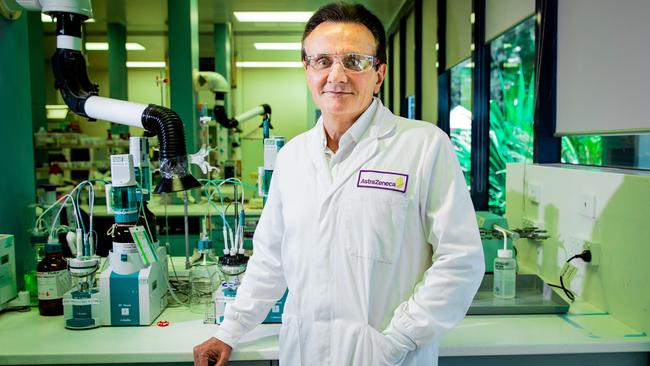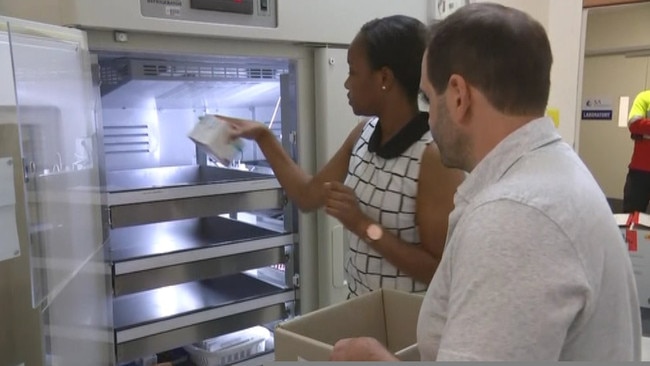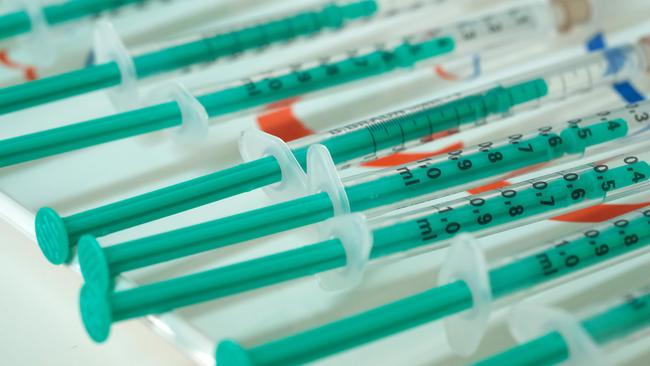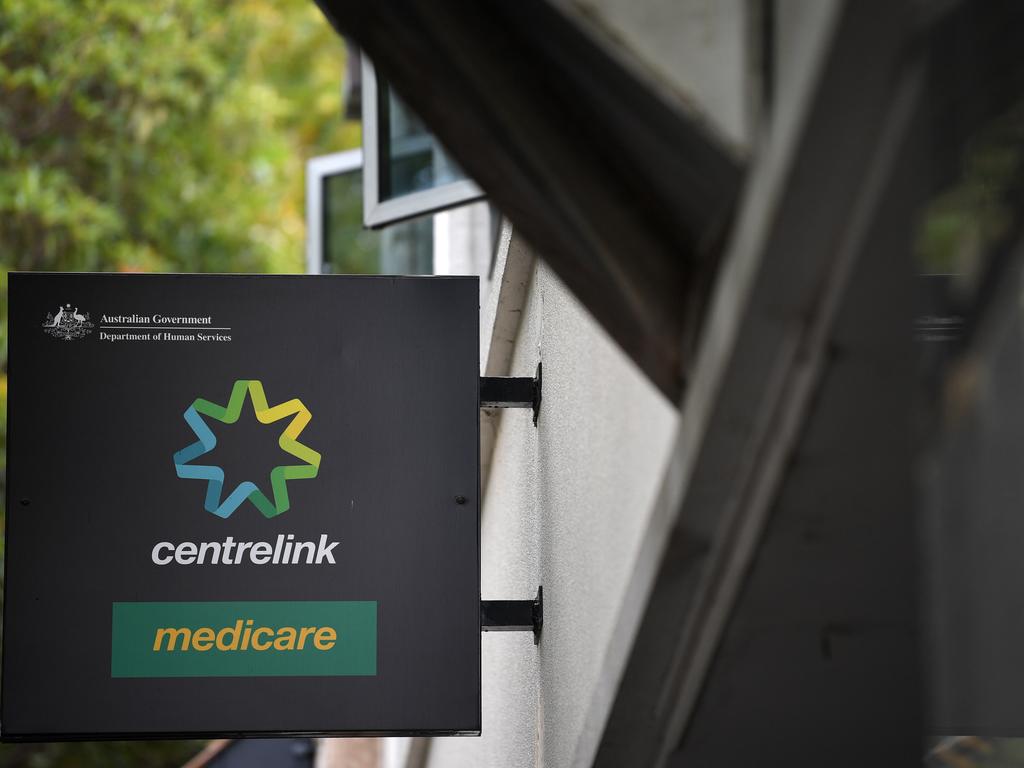Coronavirus: AstraZeneca CEO Pascal Soriot says vaccine is 100 per cent effective
AstraZeneca’s global boss says its vaccine is 100 per cent effective against severe disease as the first doses are rolled out in Australia.

The global head of AstraZeneca has declared the company’s vaccine is 100 per cent effective against severe disease as the first doses are rolled out in Australia on Friday to about 90 frontline health staff in the South Australian town of Murray Bridge.
Chief executive Pascal Soriot said the company’s vaccine would be as effective as Pfizer based on the latest real-world data, and Australia’s decision to manufacture 50 million doses domestically was vital to its national security.
Western Australia will be the second state to roll out AstraZeneca vaccines and other states will follow next week.
With the rollout gaining momentum, Mr Soriot called on the government to crush fake news from anti-vaxxers and deliver the message the jabs could free the country from the pandemic.
“I don’t mean just the political leadership, I’m talking about the scientific leadership, the TGA in this country, the chief medical officers, the people in charge of vaccination guidelines and recommendations; those people need to speak up and educate and reassure, because people listen to scientists,” he said.
“The goal here is to protect as many people as possible to save lives, but also to start the economy. We cannot do this if people do not get vaccinated.”
The pharmaceutical giant has committed to supply three billion doses to 145 countries.
The French-Australian dual-national, who is running the entire operation from Sydney, attacked anti-vaxxers such as businessman Clive Palmer, who took out a full-page newspaper advertisement on “COVID-19 Vaccine concerns”.
“The people who are public figures, who are known, they should remember their word counts and they should really think about what they say” Mr Soriot said.
Mr Palmer’s claim that the AstraZeneca and Pfizer vaccines had been given a rushed emergency approval by the government was untrue. “That was not correct,” Mr Soriot said. “It is a full approval.”
The vaccines had also been approved in the US and Britain since December, and have since been approved in Canada and Europe. “Millions of people have now received these vaccines,” he said.
The AstraZeneca chief said the vaccine production with CSL for Australia was on schedule and he pointed to Britain as the role model for a government-led rollout.

“Very fast, very organised,” he said. “It has been an effort like the Dunkirk evacuation.”
Mr Soriot moved to bust the myth that he AstraZeneca vaccine was a poor substitute for the Pfizer jab taken by Scott Morrison. Clinical data in recent weeks had put the AstraZeneca vaccine at about 76 per cent to 83 per cent efficacy compared with Pfizer’s 93 per cent, but Mr Soriot said results from the clinical trials were measured differently. He said after one month AstraZeneca’s clinical trials showed 100 per cent protection against severe disease. Importantly, there was real-world evidence from the vaccine rollout in Britain that if anything put AstraZeneca ahead of Pfizer.
“In Scotland with 1 million people vaccinated, there is a 94 per cent reduction of hospitalisations for vaccinations,” he said. “The Pfizer vaccine in those studies is 85 per cent, but it varies.”
One difference between the two vaccines was that the second dose of the AstraZeneca vaccine needed to be given three months after the first. “If you do that you get north of 80 per cent efficacy long term. I would say there is more and more data coming out to say the vaccines are very similar,” Mr Soriot said.
The question that remained was how long vaccine protection would last. The current expectation was for at least a year, but there may be boosters needed to cope with variants.
Mr Soriot is overseeing a vaccine rollout throughout the world on about five hours sleep a night. His has two shifts: the first starts very early and a second that runs into the night in Australia.
There are now four main COVID vaccines on the market: AstraZeneca, Pfizer, Moderna and Johnson & Johnson. But AstraZeneca has committed to supplying three billion doses without making a profit.
“We decided to do this because we though that is right thing to do. Doing the right thing’ is one of our values,” Mr Soriot said.
“We partnered with Oxford University and for them also it was important to do it for no profit. And the reason is that if you don’t vaccinate the whole world everybody remains exposed. If you don’t offer to all, first it’s not fair, but secondly you give the virus an opportunity to mutate in a huge number of people and then it comes back and infects Europe and the US with a mutation that is resistant to the mutation.”
So far AstraZeneca is the only big pharmaceutical company to supply the World Health Organisation’s Covax initiative that supplies low-income countries.
AstraZeneca is the biggest manufacturer of COVID vaccine at 100 million doses a month and is set to double in April.
The vaccine is also proving very valuable for remote Indigenous communities in Australia and around the world. “The vaccine is easy to use, you don’t have cold chain challenges,” Mr Soriot said. “You put it in the fridge vaccinated a few people, put it back in the fridge and then take it out later for others.”
AstraZeneca’s share price sits slightly lower than it did 12 months ago, while Pfizer and Moderna’s have increased. “I haven’t heard anyone complain and our shareholders are thankful for the communities they live in,” he said. “Secondly, they are shareholders of AstraZeneca but also shareholders of the world stock market.

“One objective is to save lives, another is to restart the economy around the world, so as soon as we can restart economies, the stock market will go up so they benefit from this.”
Mr Soriot said the Australian government had handled the pandemic well, managing the disease and sourcing vaccines and very importantly, in manufacturing vaccines locally, so the country could be independent.
“Selecting CSL for local manufacturing has been a great decision by the government because look at what is happening around the world” he said.
“Countries are holding onto their supply everywhere. A year ago everybody was talking about sharing, fair and equitable access. Now they’re saying, fair and equitable access yes, but after I’ve been served.
“I really believe that it is key for Australia to have its own strategic independence from a vaccine point of view.”
As such a dark time, Mr Soriot believed that the industrial lessons had been as important as clear gains in research.
“For science, it’s an enormous innovation, the emergence of mRNA tech has been a great innovation and the success with the vector virus is also a great progress because it can be used for other vaccines,” he said.
By October, every Australian would have had the chance to be vaccinated against COVID-19. The vaccine companies had delivered, now it was up to the rollout to deliver and for Team Australia to crush fake news.
“The one thing needed is education to bust all this myth and rumour and innuendos that some people are spreading, which quite frankly is actually putting the lives of people at risk,” Mr Soriot said.
“Some people are hesitant to get vaccinated because of this and if they get infected, the risk of getting hospitalised is substantial if they are older or if they have risk factors.”







To join the conversation, please log in. Don't have an account? Register
Join the conversation, you are commenting as Logout